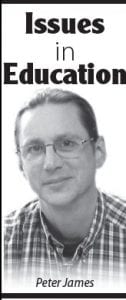It may be true that “misery acquaints a man with strange bedfellows,” but political opportunity most certainly does. The chance to score political points has players of very different stripes lining up in the latest game of hot potato: The Common Core State Standards (CCSS). Many were for it before they were against it; some were against it before they were for it; and most people aren’t even very sure what “it” is.
A condensed version of the CCSS history has its roots in the mediocre performance of American students in comparison to those from other countries. Efforts to make improvements sought to hold schools accountable for meeting academic standards; however, each state was empowered to develop its own standards and, as a result, had its schools evaluated using different measures. The National Governors Association organized an initiative to ensure that all students were held to the same requirements, that students could move from state to state and be academically successful, and that graduates from every system would be adequately prepared to enter college or the workforce. The result was a collection of standards regarding what education and industry experts believed students should know and be able to do, by grade level, in mathematics and language arts. Most folks thought so far, so good; but it’s been a mess ever since.
Under its “Race to the Top” program, the federal government made adoption of the CCSS the easiest path to get additional funds and a waiver from the “No Child Left Behind” accountability, and more than 80 percent of states chose to go that route. Huge textbook publishers and testing companies rushed products to market to take advantage of the need for new curriculum and assessments that schools had to buy, locking school districts in and competitors out. Teachers became obligated – often without much training – to teach the new curriculum and be held accountable for student performance during the transition. There is something for everyone to complain about, and some states have even withdrawn their adoption of CCSS. The kindest spin on the situation has been that it was a good idea, just very poorly implemented.
It bears looking underneath the mess, beyond the CCSS, and to ask ourselves some questions about what lies at the heart of the matter. Do we want a national education program that prescribes uniform outcomes for every student? If we do, how are those outcomes established and how do we ensure the system delivers them?
If we don’t, how do we ensure our education system is serving the public interest and is equitable amongst varied populations? How much state or local discretion do we want for how standards are implemented, what curriculum is used, and what structures organize our schools?
Where should funding for public education come from and how do we make sure the money is well spent? What is the role of the teaching professional in determining the best way to meet the needs of their students, and what is the role of the teacher unions? Where and how do decisions get made about accountability for teachers, schools, districts, and the larger education system?
Answers involve tradeoffs. For those who are seeking primarily to rally support, there are many different aspects in the CCSS situation that can be exploited to their advantage. However, we should not accept the simple answers and superficial sound bites that are offered by self-interested partisans.
Our public education system is vast, complex, and politically-charged. It has many stakeholders with often competing interests. Making changes to it is difficult and usually results in unintended consequences as well. Still, we must engage persistently in the hard work involved with the giveand take, setbacks, and shortcomings that are part of moving things forward.
So, are the Common Core State Standards good or bad? In and of themselves, they are probably neither. How we respond to them could be either. The turmoil surrounding the CCSS and the new energy focused on education that they have provoked foreshadow major changes. The results of these changes are ultimately how we will measure the effect of the CCSS. We should insist that the bigger issues that frame our education system be addressed in substantial ways. The public education system needs to be viewed in light of its essential and integral role in our society, and decisions must consider more than the next election cycle, business opportunity, or vested interest.
Because in its essence, our system is about children – children who must develop knowledge and skills to live connected, productive, and meaningful lives in our society – about teachers – teachers whose relationships with children provide them unique opportunities to inspire, facilitate, and encourage learning – and about our shared commitment to support the important work they do together.
Each month a representative of our local schools will offer thoughts in Issues in Education. This month’s contributor is Peter James, Great Expectations School.



Loading Comments